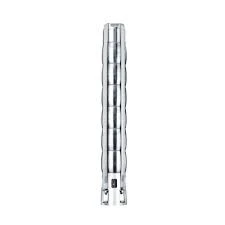Dec . 13, 2024 19:31 Back to list
How long can a submerged pump efficiently operate without surfacing?
How Long Can a Submersible Pump Stay Underwater?
Submersible pumps play a crucial role in various applications, from dewatering construction sites to providing groundwater for agricultural needs. Understanding the duration a submersible pump can remain underwater hinges on multiple factors, including the pump's design, material, and the environmental conditions it operates in. This article delves into these aspects to provide a comprehensive overview of submersible pumps and their underwater endurance.
Understanding Submersible Pumps
Submersible pumps are designed to function while fully submerged in liquid. They operate by converting electrical energy into mechanical energy, enabling them to pump fluids from one location to another. These pumps are typically encased in a sealed housing to prevent water from entering and damaging the electrical components. The specific design and materials used in making these pumps greatly affect their longevity and functionality underwater.
Materials and Sealing
The materials used in submersible pump construction play a significant role in determining how long they can remain underwater effectively. Most submersible pumps are constructed from corrosion-resistant materials, such as stainless steel, aluminum, or specialized plastics, which minimize the risk of degradation caused by prolonged exposure to water.
Sealing is another essential factor. Submersible pumps utilize robust seals and gaskets to ensure that water does not enter the motor compartment. Pumps equipped with high-quality mechanical seals can remain submerged for extended periods without compromising their integrity. However, even the best seals can wear down over time, especially if exposed to abrasive particles or chemicals in the water.
Ambient Conditions
how long can a submersible pump stay underwater

The conditions of the surrounding environment also significantly impact how long a submersible pump can function. High temperatures can stress the pump's materials and seals, potentially leading to failure if the pump is not rated for such conditions. For example, a pump operating in hot water might have a reduced lifespan compared to one submerged in cooler conditions. In addition, factors like water quality (e.g., debris, sediment, and chemical composition) play a vital role in the degradation of both the pump and its components.
Typical Lifespan
While it’s difficult to provide a definitive answer to how long a submersible pump can stay underwater, many pumps are designed for continuous operation in submerged conditions. Quality pumps can often operate continuously for several years, provided they are well-maintained and not subjected to extreme conditions. Routine checks, including inspecting seals and cleaning any blockages, can enhance the water pump’s durability and functionality.
Operational Limits
Although submersible pumps are designed for prolonged use underwater, they should not operate continuously without assessment. Many manufacturers provide guidelines indicating the maximum depth and duration for which their pumps can effectively function. For instance, pumps may have limits on pressure levels caused by water depth, which if exceeded, can lead to mechanical failure.
In practical applications, users should also consider scheduling temporary pauses for maintenance checks, which can significantly extend the pump's lifespan. Regular inspections can identify potential issues before they lead to costly repairs or replacements, ensuring that the pump remains functional for as long as possible.
Conclusion
Submersible pumps are robust engineering solutions designed for underwater operation. With appropriate materials, sealing technology, and favorable environmental conditions, these pumps can function efficiently for extended periods underwater, often several years. However, to maximize durability and performance, regular maintenance is essential. Users should remain attentive to operational limits set by manufacturers and environmental factors that can affect the pump’s longevity. By doing so, one can ensure that submersible pumps continue to serve their vital purposes without unexpected failures or costly downtimes.
-
Submersible Water Pump: The Efficient 'Power Pioneer' of the Underwater World
NewsJul.01,2025
-
Submersible Pond Pump: The Hidden Guardian of Water Landscape Ecology
NewsJul.01,2025
-
Stainless Well Pump: A Reliable and Durable Pumping Main Force
NewsJul.01,2025
-
Stainless Steel Submersible Pump: An Efficient and Versatile Tool for Underwater Operations
NewsJul.01,2025
-
Deep Well Submersible Pump: An Efficient 'Sucker' of Groundwater Sources
NewsJul.01,2025
-
Deep Water Well Pump: An Efficient 'Sucker' of Groundwater Sources
NewsJul.01,2025
-
 Submersible Water Pump: The Efficient 'Power Pioneer' of the Underwater WorldIn the field of hydraulic equipment, the Submersible Water Pump has become the core equipment for underwater operations and water resource transportation due to its unique design and excellent performance.Detail
Submersible Water Pump: The Efficient 'Power Pioneer' of the Underwater WorldIn the field of hydraulic equipment, the Submersible Water Pump has become the core equipment for underwater operations and water resource transportation due to its unique design and excellent performance.Detail -
 Submersible Pond Pump: The Hidden Guardian of Water Landscape EcologyIn courtyard landscapes, ecological ponds, and even small-scale water conservancy projects, there is a silent yet indispensable equipment - the Submersible Pond Pump.Detail
Submersible Pond Pump: The Hidden Guardian of Water Landscape EcologyIn courtyard landscapes, ecological ponds, and even small-scale water conservancy projects, there is a silent yet indispensable equipment - the Submersible Pond Pump.Detail -
 Stainless Well Pump: A Reliable and Durable Pumping Main ForceIn the field of water resource transportation, Stainless Well Pump has become the core equipment for various pumping scenarios with its excellent performance and reliable quality.Detail
Stainless Well Pump: A Reliable and Durable Pumping Main ForceIn the field of water resource transportation, Stainless Well Pump has become the core equipment for various pumping scenarios with its excellent performance and reliable quality.Detail
